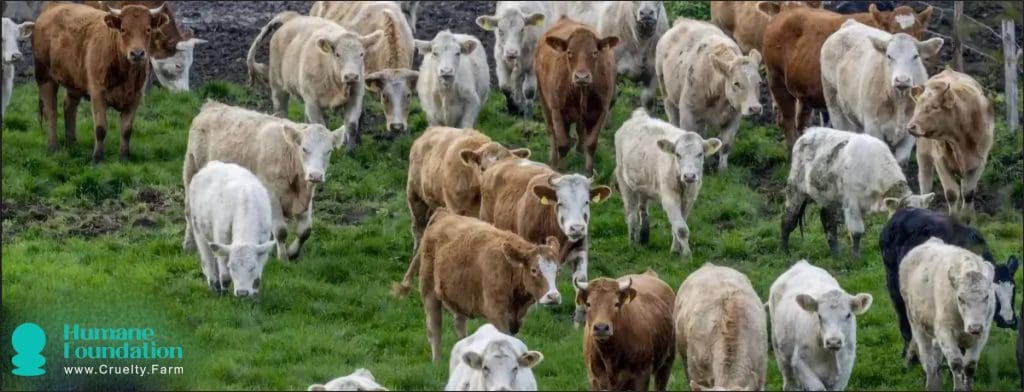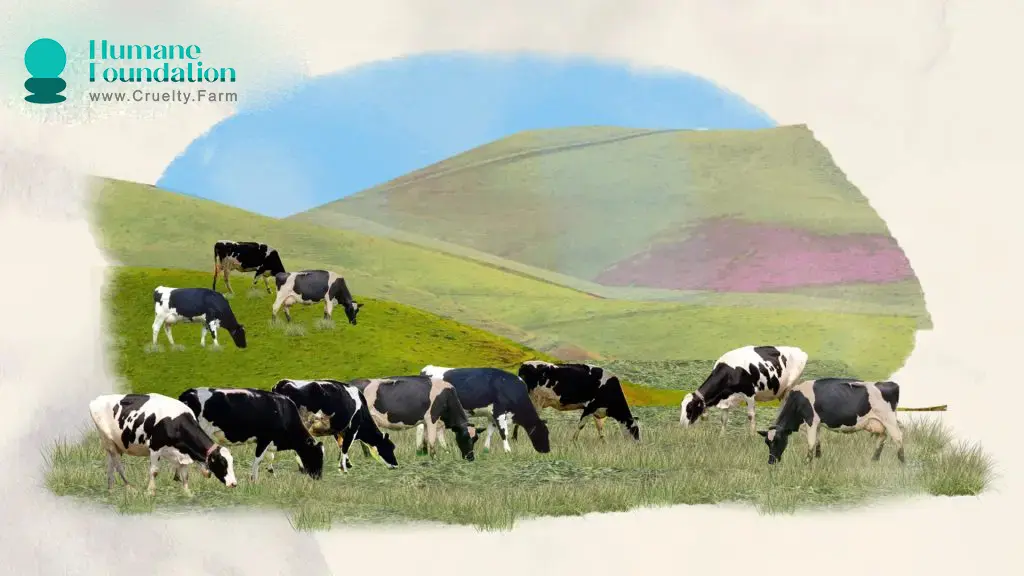Konzumacija mesa je vekovima bila sastavni deo ljudske ishrane, obezbeđujući dragocen izvor proteina i esencijalnih hranljivih materija. Međutim, s globalnom potražnjom za mesom u stalnom porastu, utjecaj njegove proizvodnje na okoliš postao je goruća briga. Utvrđeno je da proces proizvodnje mesa, od uzgoja stoke do obrade i transporta, značajno doprinosi emisiji stakleničkih plinova, krčenju šuma i zagađenju vode. Kako potrošači postaju svjesniji svog ekološkog otiska, poziv na održivu i etičku proizvodnju mesa postaje sve glasniji. Kako bi se riješio ovaj problem, neophodno je razumjeti utjecaj proizvodnje mesa na okoliš i identificirati načine za smanjenje njegovih negativnih učinaka. U ovom članku ćemo se zadubiti u putovanje mesa od farme do vilice, pratiti njegov ekološki otisak i istražujući potencijalna rješenja za održiviju proizvodnju mesa. Rasvjetljavajući ovu temu, nadamo se da ćemo osnažiti potrošače znanjem da donose informirane odluke o potrošnji hrane i njenom utjecaju na planetu.

Otkrivena ekološka devastacija fabričke poljoprivrede
Ovaj sveobuhvatni članak će detaljno opisati ekstenzivnu degradaciju životne sredine uzrokovanu fabričkom poljoprivredom, uključujući krčenje šuma, zagađenje vode i emisije gasova staklene bašte, naglašavajući hitnu potrebu za održivim alternativama. Fabrička poljoprivreda, sa fokusom na masovnu proizvodnju i maksimiziranje profita, rezultirala je značajnim ekološkim posljedicama. Jedan od glavnih problema je krčenje šuma, jer se velike površine zemlje krče kako bi se napravilo mjesto za usjeve za stočnu hranu i pašnjake. Ovo uništavanje šuma ne samo da doprinosi gubitku biodiverziteta, već i pogoršava klimatske promjene smanjujući kapacitet Zemlje da apsorbuje ugljični dioksid. Osim toga, tvorničke poljoprivredne operacije stvaraju ogromne količine otpada, koji često kontaminira obližnje izvore vode . Ispuštanje neobrađenog životinjskog otpada u rijeke i potoke dovodi do zagađenja vode, štetnog za vodene ekosisteme i zdravlje ljudi. Nadalje, intenzivno korištenje resursa kao što su voda i energija, zajedno s oslobađanjem metana i dušikovog oksida iz životinjskog otpada, doprinosi emisiji stakleničkih plinova, pogoršavajući klimatske promjene. Nalazi predstavljeni u ovom dokumentu služe kao poziv na buđenje hitne potrebe za prelaskom na održive i etičke prakse u proizvodnji mesa, osiguravajući očuvanje naše životne sredine za buduće generacije.

Krčenje šuma: tamna strana mesa
Štetni uticaj fabričke poljoprivrede seže dalje od zagađenja vode i emisije gasova staklene bašte; također potiče krčenje šuma, otkrivajući tamnu stranu proizvodnje mesa. Kako potražnja za mesom i dalje raste, veliki dijelovi šuma se krče kako bi se otvorio prostor za uzgoj stoke i uzgoj stočne hrane. Ovo široko rasprostranjeno krčenje šuma ne samo da uništava vitalna staništa za bezbroj vrsta, već i narušava delikatnu ravnotežu naših ekosistema. Gubitak stabala dodatno doprinosi klimatskim promjenama, jer šume igraju ključnu ulogu u apsorpciji ugljičnog dioksida i ublažavanju njegovih efekata. Ove alarmantne posljedice naglašavaju hitnu potrebu za održivim alternativama u industriji proizvodnje mesa. Prihvaćanjem ekološki prihvatljivije prakse i promoviranjem biljnih alternativa, možemo ublažiti krčenje šuma i stvoriti održiviji i etičniji sistem ishrane.
Zagađenje vode: skriveni trošak
Zagađenje vode je još jedan skriveni trošak proizvodnje mesa koji često ostaje neprimijećen. Ovaj sveobuhvatni članak će detaljno opisati ekstenzivnu degradaciju životne sredine uzrokovanu fabričkom poljoprivredom, uključujući krčenje šuma, zagađenje vode i emisije gasova staklene bašte, naglašavajući hitnu potrebu za održivim alternativama. Intenzivna upotreba đubriva i pesticida u uzgoju stočne hrane dovodi do oticanja koji kontaminira obližnje izvore vode. Osim toga, otpad koji proizvodi stoka, uključujući stajnjak i hemikalije, pronalazi put u rijeke, jezera i podzemne vode, predstavljajući ozbiljnu prijetnju vodenim ekosistemima i ljudskom zdravlju. Zagađenje vodnih tijela ne samo da utječe na osjetljivu ravnotežu vodenog svijeta, već i na zajednice koje se oslanjaju na ove izvore vode za piće, navodnjavanje i druge bitne aktivnosti. Rješavanje ovog skrivenog troška zahtijeva pomak ka održivijim poljoprivrednim praksama koje daju prioritet očuvanju vode i odgovarajućim sistemima upravljanja otpadom.
Emisije stakleničkih plinova: opasna stvarnost
Emisije stakleničkih plinova predstavljaju opasnu stvarnost koja se ne može zanemariti. Proizvodnja mesa, posebno kroz fabričke uzgoje, značajno doprinosi ovim emisijama. Oslobađanje metana iz digestije stoke i upravljanja stajnjakom, kao i energetski intenzivni procesi uključeni u proizvodnju mesa, doprinose povećanju nivoa stakleničkih gasova u atmosferi. Ovaj sveobuhvatni članak će se baviti alarmantnim utjecajem ovih emisija na klimatske promjene, naglašavajući hitnu potrebu za održivim alternativama. Posljedice nekontroliranih emisija stakleničkih plinova su dalekosežne, što dovodi do porasta globalnih temperatura, ekstremnih vremenskih pojava i narušavanja ekosistema. Od ključne je važnosti za kreatore politike, industrije i pojedince da se pozabave ovim pitanjem sa osjećajem hitnosti, aktivno tražeći i implementirajući održive prakse koje ublažavaju emisije stakleničkih plinova i promoviraju zeleniju budućnost.
Pronalaženje održivih rješenja za proizvodnju mesa
Za rješavanje opsežne degradacije okoliša uzrokovane fabričkim uzgojem, uključujući krčenje šuma, zagađenje vode i emisije stakleničkih plinova, ključno je istražiti održiva rješenja za proizvodnju mesa. Ovo uključuje preispitivanje trenutne poljoprivredne prakse i prihvaćanje inovativnih pristupa koji daju prioritet brizi o okolišu i dobrobiti životinja. Prelazak na regenerativne poljoprivredne metode, kao što su rotirajuća ispaša i agrošumarstvo, može pomoći u obnavljanju zdravlja tla, smanjenju potrebe za kemijskim unosima i izdvajanju ugljika. Osim toga, ulaganje u alternativne izvore proteina, kao što su biljno i uzgojeno meso, može značajno smanjiti zahtjeve za zemljištem, vodom i energijom, dok i dalje pruža održive opcije za potrošače. Naglašavanje važnosti održive proizvodnje mesa u ovom sveobuhvatnom članku ne samo da će rasvijetliti postojeće izazove, već će i inspirisati i usmjeriti industriju ka budućnosti koja je ekološki svjesnija.
Zaključno, uticaj proizvodnje mesa na životnu sredinu je složeno i višestruko pitanje. Od emisija koje nastaju uzgojem i transportom stoke, do krčenja šuma i degradacije zemljišta uzrokovanih proširenjem proizvodnje ispaše i stočne hrane, jasno je da mesna industrija ima značajan ugljični otisak. Međutim, povećanjem svijesti o tome odakle dolazi naše meso i donošenjem održivijih izbora, možemo raditi na smanjenju utjecaja proizvodnje mesa na okoliš. Na svima nama je da preduzmemo akciju i napravimo razliku u stvaranju održivijeg sistema ishrane za budućnost.

FAQ
Koji su glavni uticaji na životnu sredinu povezani sa proizvodnjom mesa, od farme do račve?
Glavni uticaji na životnu sredinu povezani sa proizvodnjom mesa, od farme do račva, uključuju krčenje šuma za ispašu i stočnu hranu, emisije gasova staklene bašte iz stoke, zagađenje vode životinjskim otpadom, prekomernu potrošnju vode za stoku i gubitak biodiverziteta usled uništavanja staništa. Proizvodnja mesa značajno doprinosi klimatskim promjenama, čineći značajan dio globalnih emisija stakleničkih plinova. To također vrši pritisak na vodne resurse, jer uzgoj stoke zahtijeva velike količine vode. Osim toga, upotreba pesticida i đubriva za krmne kulture može dovesti do zagađenja vode. Ekspanzija stočarstva često dovodi do krčenja šuma, uništavanja staništa i ugrožavanja biodiverziteta.
Kakav je ekološki otisak proizvodnje mesa u poređenju sa otiskom biljnih alternativa?
Proizvodnja mesa općenito ima veći ekološki otisak u usporedbi s biljnim alternativama. Stočarstvo značajno doprinosi krčenju šuma, emisiji stakleničkih plinova, zagađenju vode i gubitku biodiverziteta. Poljoprivreda životinja zahtijeva ogromne količine zemlje, vode i hrane, što dovodi do uništavanja staništa i prekomjerne upotrebe resursa. Osim toga, proizvodnja i transport stočne hrane, kao i prerada i hlađenje mesa, energetski su intenzivni procesi. Nasuprot tome, biljne alternative imaju manji utjecaj na okoliš jer koriste manje resursa, emituju manje stakleničkih plinova i zahtijevaju manje zemlje i vode. Prelazak na biljnu ishranu može pomoći u smanjenju ekološkog otiska povezanog s proizvodnjom hrane.
Koje su neke održive prakse koje se mogu primijeniti u proizvodnji mesa kako bi se smanjio njegov utjecaj na okoliš?
Neke održive prakse koje se mogu implementirati u proizvodnju mesa kako bi se smanjio njegov uticaj na životnu sredinu uključuju promociju regenerativnih poljoprivrednih tehnika, kao što su rotacione ispaše i pokrovni usevi, kako bi se poboljšalo zdravlje tla i smanjila potreba za hemijskim inputima. Osim toga, povećanje upotrebe obnovljivih izvora energije i poboljšanje energetske efikasnosti u postrojenjima za preradu mesa može pomoći u smanjenju emisije stakleničkih plinova. Usvajanje mjera za očuvanje vode, kao što je korištenje efikasnih sistema za navodnjavanje i hvatanje i ponovno korištenje vode, također može doprinijeti smanjenju uticaja proizvodnje mesa na okoliš. Konačno, promoviranje upotrebe nusproizvoda i otpada od hrane u stočnoj hrani može pomoći u smanjenju rasipanja resursa i podržati kružnu ekonomiju.
Kako potrošači mogu donijeti ekološki svjesnije izbore kada je u pitanju konzumacija mesa?
Potrošači mogu donijeti ekološki svjesnije odluke kada je u pitanju konzumacija mesa smanjenjem ukupne potrošnje mesa, odabirom biljnih alternativa, podržavanjem lokalnih i održivih proizvođača mesa i odabirom mesa koje je certificirano organsko ili uzgojeno bez upotrebe antibiotika i hormona. . Osim toga, potrošači mogu dati prednost mesu koje dolazi od životinja uzgojenih na pašnjacima ili u slobodnom uzgoju, jer to obično ima manji utjecaj na okoliš. Vodeći računa o ekološkim posljedicama naših izbora ishrane i donošenje svjesnih odluka može doprinijeti održivijem i ekološki prihvatljivom sistemu ishrane .
Koju ulogu imaju državni propisi u ublažavanju ekološkog otiska proizvodnje mesa?
Državna regulativa igra ključnu ulogu u ublažavanju uticaja proizvodnje mesa na životnu sredinu implementacijom i sprovođenjem politika i standarda koji promovišu održive prakse. Ovi propisi mogu uključivati mjere za smanjenje emisija stakleničkih plinova, zagađenja vode i zemljišta, te krčenje šuma vezano za proizvodnju mesa. Oni također mogu potaknuti usvajanje održivijih poljoprivrednih metoda, kao što je organska ili regenerativna poljoprivreda, i promovirati očuvanje prirodnih resursa. Osim toga, državni propisi mogu zahtijevati transparentnost i označavanje mesnih proizvoda kako bi se potrošači informirali o utjecaju njihovih izbora na okoliš i podstakli potražnju za održivijim opcijama. Sve u svemu, državna regulativa je od suštinskog značaja za pokretanje i usmjeravanje industrije prema ekološki prihvatljivijim praksama.















































